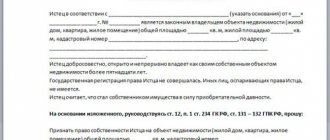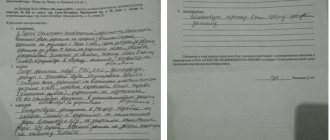Regulatory framework for shared construction
The relationship between the developer and the shareholder is a property relationship. Therefore, they are regulated by civil law. But a number of points are regulated by other acts. For example, the Tax Code. The liability of developers for fraud with apartments is provided for in the Criminal Code of the Russian Federation. There is also a special law - Federal Law of December 30, 2004 N 214-FZ “On participation in shared-equity construction of apartment buildings and other real estate and on amendments to certain legislative acts of the Russian Federation.” Its adoption made it possible to reduce the severity of relations between developers, shareholders and the state.
Civil legislation
Despite the fact that shared construction belongs to civil legal relations, there are no norms directly devoted to it in the Civil Code of the Russian Federation. But in Art. 130 of the Civil Code of the Russian Federation defines this type of real estate as an unfinished construction project. The introduction of precisely this wording into the text in 2004 made it possible both for shared construction itself and for mortgages (loans secured by real estate) for apartments in houses under construction.
This method of the bank to ensure that the borrower fulfills the obligation to repay the debt is discussed in Art. 334 Civil Code of the Russian Federation . This act also states that state registration is required for rights to real estate and contracts related to it ( Article 131 of the Civil Code of the Russian Federation ). Without it, that is, without entering information into a special state register, all transactions will be invalid.
Special law
By 2004, it became clear that the accumulated problems of shared-equity construction could not be solved using existing legal provisions. Then a special law was adopted - N 214-FZ (Law). It regulates exclusively relations in the field of shared construction. Namely:
- introduces the concept of shared construction object;
- allows developers to raise funds from citizens;
- regulates the conclusion of an equity participation agreement (hereinafter referred to as the DPA);
- prescribes the rights of the parties and their responsibilities (only property);
- establishes measures to ensure that the developer fulfills his obligations (pledge, surety, insurance);
- introduces compulsory state registration of preschool educational institutions and assignment of claims;
- includes a list of documents required for the developer;
- establishes state supervision in this area.
Responsibility
The developer is responsible to his shareholders. Depending on what kind of violations they commit, their liability may be:
- Property. An unfulfilled contract threatens the developer not only with the return of the shareholder’s funds, but also with a substantial penalty ( Article 10 of Federal Law No. 214 ).
- Administrative. You will have to pay a fine for violating the laws on shared construction ( Article 14.28 of the Code of Administrative Offences ) and for failure to comply with the instructions of supervisory authorities ( Article 19.5 of the Code of Administrative Offenses ).
- Criminal. Deception of shareholders is classified as fraud ( Article 159 of the Criminal Code of the Russian Federation ). He faces either a substantial fine of 1 million or 10 years in prison.
How is ownership registered in a new building?
In theory, everything is simple. The detailed procedure for formalizing and registering ownership rights to an apartment in a new building is determined in accordance with the Federal Law. After reading the Federal Law “On registration and recognition of ownership of a house, apartment and transactions with them,” you will learn a clear and well-thought-out mechanism for obtaining rights. On the one hand, this document completely prohibits the disposal of real estate, since it does not legally belong to the new owners. On the other hand, it clearly describes the mechanisms within which the registration of ownership is carried out:
- The developer himself can issue all the documents to the residents for full ownership. This option will usually require financial costs, but for the most part, the developer is trying in every possible way to avoid hassles that are not related to profit.
- Independent registration of ownership rights based on equity participation agreements. The specialists of the Star-Service Center for Cadastre and Registration will help you with this, who will provide full legal support during the registration of real estate transactions, speed up the process of obtaining a technical passport of the BTI, extracts, certificates and acts.
- Filing a claim in court that reflects a violation of your rights. In this case, you will need to pay a state fee, as well as legal support from specialists who will accompany the process. On average, the trial lasts about 2-3 months, as a result of which a court order is issued to the developer to quickly register the ownership rights of the shareholder.
- Full support for registration of property rights consulting offers affordable prices for its services and assistance from some of the best lawyers in the field of property and civil law in Moscow.
Naturally, the simplest, fastest and least expensive option is when the developer independently resolves bureaucratic issues, however, judging by practice, the developer is usually in no hurry in this regard.
Rights of participants in shared construction and their protection
The main right of the developer is to attract money from other participants for shared construction. But for this you will need to obtain a construction permit, submit a project declaration to Rosreestr and the supervisory authority, and post a copy of it on the Internet. Two weeks after publication, you can conclude a DDU and accept contributions from shareholders.
Legislators granted much more rights to shareholders. They have the right:
- require the developer to provide original permitting documents;
- terminate the contract (but only on the grounds of Article 9 of the Law );
- demand the transfer of the apartment after the house is put into operation;
- demand compensation for losses and payment of penalties for violations by the developer ( Article 10 of the Law );
- assign your right to an apartment under construction ( Article 11 of the Law );
- be the mortgagee of the land plot under the house under construction ( Article 13 of the Law );
- be a beneficiary in the case of developer liability insurance;
- register ownership of the transferred apartment;
- demand that they be recognized as victims of the actions of the developer and enter data into a special register;
- seek protection from the state.
The law protects not only shareholders, but also the developer. He can terminate the DDU if the other party violates its obligation to pay. No penalties or penalties are paid in this case. The fault in such a situation lies with the shareholder.
In addition to the rights and obligations of the developer and participants to each other, shared construction also involves the emergence of rights to real estate. This right must be registered with Rosreestr after the house is accepted by the state commission and put into operation.
Both parties can go to court to protect their rights. Most often, the victims are, of course, the participants (shareholders). For their defense, they will need a shared construction lawyer, since the current judicial practice, unfortunately, indicates that only a small percentage of cases result in the return of funds.
Recognition of ownership of an apartment in a new building
Author: Ekaterina Viktorovna Kotova , lawyer at the law firm Subscriber Consult.
ARE YOU Familiar with THIS SITUATION : You have invested money in the purchase of an apartment in a new building, which has been completed and put into operation, however, the developer is in no hurry to register the transfer of ownership. You live in an apartment, you have a temporary order to move into the residential premises, you bear the costs of maintaining the apartment, for example, pay for utilities, but you are not the owner.
The lack of ownership rights puts you in an extremely unprotected position from the point of view of the law, since a situation is possible when an unscrupulous developer resells the apartment several times under different contracts to different people, and the buyers will not be able to verify this fact at the time of concluding the contract.
The best way out of this situation is recognition of ownership of the apartment through the court.
Lawyers have extensive experience in real estate transactions and recognition of property rights. We will analyze your contracts and documents and select the best solution to the problem.
The approximate cost of our services will be 40,000 rubles , which we will bill to the developer as legal expenses. Read about how to calculate the state fee for recognizing the right to an apartment here
WHICH COURT TO FILE A STATEMENT OF CLAIM: at the location of the real estate (Clause 1, Article 30 of the Code of Civil Procedure of the Russian Federation).
WHAT YOU NEED TO PROVE TO RECOGNIZE OWNERSHIP:
- The plaintiff paid the cost of the apartment in full;
- The construction of the residential building in which the apartment is located has been completed, the house has been put into operation, the house has been assigned a postal address, the apartment has passed state technical registration in the BTI, the apartment has been assigned a cadastral number;
- The defendant transferred the apartment to the plaintiff for actual possession and use (this fact is confirmed by the Temporary Order for moving into the residential premises);
- There are no registered rights of third parties to the apartment; other persons do not claim rights to the apartment.
- The plaintiff bears the costs associated with maintaining the apartment, namely:
- pays rent;
- pays utility bills (there are no debts on utility bills);
- pays other payments. Good evidence is the agreement concluded with the management company.
WHAT DOCUMENTS SHOULD BE PROVIDED TO THE COURT TO RECOGNIZE OWNERSHIP:
- Directly all the contracts you have and additional agreements to them (purchase and sale agreement, preliminary agreement, agreement on assignment of rights of claim and transfer of debt, etc.);
- Document confirming payment for the apartment;
- An extract from the Unified State Register of Real Estate (USRN) , which indicates who is the owner of the apartment;
- Documents confirming that the house is completed. It can be:
- Acceptance certificate of a residential building completed with construction and installation work by the acceptance committee, approved by order of the prefect of a specific district of Moscow;
- Permission to put the house into operation;
- Message from Mosgosstroynadzor about the commissioning of the house;
- Conclusion on the compliance of the constructed or reconstructed capital construction facility with the requirements of technical regulations and design documentation;
- Accounting data from BTI/BTI documents, floor plan, explication;
- Cadastral passport of the premises.
- Evidence of actual ownership may include:
- An agreement between the Buyer and the Developer-Seller, according to which the buyer agreed to accept the apartment and bear full responsibility for its safety;
- The act of acceptance and transfer of the apartment (the act of acceptance and transfer of the apartment for use, the act of acceptance and transfer of apartment keys);
- Temporary order to move into residential premises;
- The act of opening access to the apartment;
- Apartment inspection report;
- Certificate of access to the apartment.
- The fact of incurring expenses for maintaining the apartment is confirmed by:
- All kinds of receipts for payment of housing and utilities; checks confirming payment for services under the agreement concluded by the plaintiff for the management of an apartment building for the provision of services and performance of work for the proper maintenance and repair of the common property of the apartment building;
- Management agreement for an apartment building.
- The absence of registered rights of third parties is confirmed:
- Extract from the Unified State Register of Real Estate;
- An act of transfer of an apartment, in which the buyer and seller confirmed that the apartment is free from any rights of third parties and is not the subject of a dispute or pledge.
POSSIBLE DIFFICULTIES:
- Instead of an agreement for the purchase and sale of an apartment, a preliminary agreement was concluded. According to paragraph 8 of the Resolution of the Plenum of the Supreme Arbitration Court of the Russian Federation dated July 11, 2011 N 54, if the parties entered into an agreement, named by them as preliminary, in which there is an obligation of the purchaser of the property to pay before concluding the main agreement the full price of real estate or a significant part of it, the court must qualify such an agreement as a contract for the sale and purchase of future real estate with the condition of prepayment. That is, this agreement in court will be equated to purchase and sale agreements. However, this fact will need to be separately proven in court.
- The extract from the Unified State Register indicates that there is no information about the owner. This means that no one contacted the registration authority to register ownership. There is judicial practice in which the courts do not perceive this circumstance as significant. If it is possible to prove all five of the above criteria (see What needs to be proven), then, as a rule, the courts do not see any obstacles to recognizing the ownership right immediately behind the buyer of the apartment (the plaintiff).
Call us at: +7 (495) 968 44 34, and we will advise you
comments powered by HyperComments
Shared construction insurance
In addition to such ways to ensure that the developer fulfills his obligations to shareholders, such as collateral of the plot and surety, the law allows another one - insurance. But it is not the shared construction object itself that is insured, since it does not exist at the time the insurance contract is concluded. It is the developer’s liability that is insured ( Article 15.2 of the Law ).
The insured event is failure to fulfill obligations - to build and transfer their apartments to the participants who paid the money; the insured is the developer. The participant (shareholder) or the investor organization has the right to receive payment. Insurance is issued even before the registration of the first child care home.
A developer can insure liability either through an insurance company or, since 2014, through a non-profit insurance company (OVS) for developers. The peculiarity of this organization is that it only insures liability under DDU. It is assumed that this method should force developers to fulfill their obligations. After all, they themselves are the founders of the OVS and it is not profitable for them to pay insurance for the actions of their less responsible comrades.
Bankruptcy of the developer is included in the grounds for obtaining insurance. But there are a number of cases that do not apply to insurance. And the insurance, accordingly, is not paid. These include:
- slowdown in construction;
- freezing an object.
The law provides for only one type of agreement in this area, that is, an equity participation agreement. However, despite the sufficient regulatory elaboration of these legal relations, participation in shared construction still has certain risks. Neither the huge amounts of penalties, nor the penalties provided for by the Criminal Code, nor the liability insurance of developers guarantee easy receipt of the keys to the apartment. However, concluding a deal always involves certain risks, but knowing the features of a particular type of contract allows you to avoid a large number of problems.




